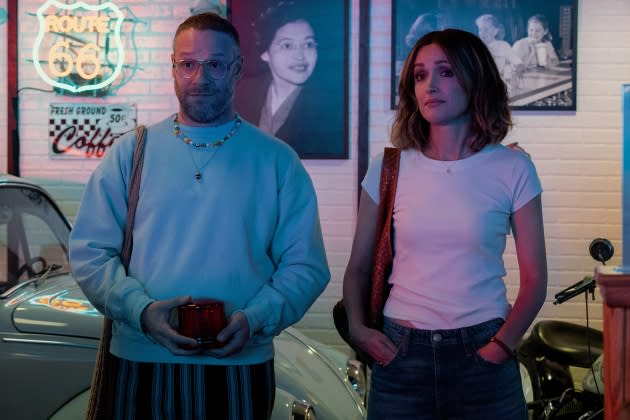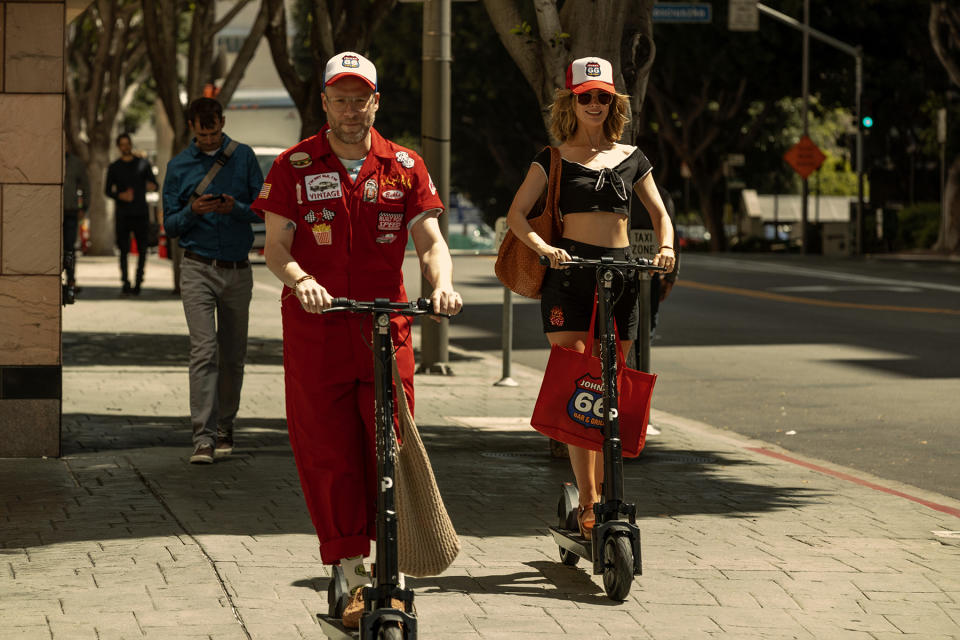Seth Rogen and Rose Byrne Want to Bring Back the Light TV Comedy
- Oops!Something went wrong.Please try again later.
- Oops!Something went wrong.Please try again later.

It’s the age-old question: can men and women be friends? Well, in Rose Byrne and Seth Rogen’s new Apple TV+ series Platonic, the most important question isn’t can they — it’s should they?
Byrne stars as Sylvia, an exhausted middle-aged mom. Once a lawyer with a promising career, she’s spent the past 13 years staying home to raise her kids, a decision that she’s less and less grateful for as she watches her lawyer husband thrive in his career. Midlife has Sylvia questioning every decision that got her here — including the loss of her former best friend Will (Rogen). The two, who were never romantically involved, stopped being friends over Sylvia’s dislike of Will’s wife. But when she learns her friend is now divorced, and working as the brewmaster at a hipster bar, the two rekindle their friendship. The problem? Sylvia and Will are at much different places in their lives, and reconnecting with each other means working around old loves and habits, and trying not to burn down their new lives in the process.
More from Rolling Stone
'You Hurt My Feelings': The Perfect Julia Louis-Dreyfus Cringe Comedy
Idris Elba Fights to Save a Plane From Terrorists in First Trailer for 'Hijack'
Byrne and Rogen tell Rolling Stone that they were inspired by past collaborations with director Nicholas Stoller and wanted to create a true comedy that keeps audiences in their seats — a goal that seems to stem from the creator’s exhaustion with dark and dramatic comedies.
“We revere comedy,” Rogen says. “And I think television especially has gotten to a place where, and God bless it, people are telling very dark and intense and heavy stories that deal with real heavy themes. This show I think wants to deal with very relatable themes, but we put a lot of effort into making something that is outwardly comedic and not bogged down by ideas and themes that hurt a truly fun and joyous experience.”

“It’s a comedy, make no mistake,” Byrne laughs. “It’s not a dark comedy. It’s not a comedy that reveals itself to be a tragedy. It’s a comedy that resonates with feeling and there’s emotional relatability and stuff. But the idea really is to keep the audience engaged and laughing. And I think it’s really hard to do that.”
Rogen’s assessment is spot-on: Platonic doesn’t bother mining the anguish of the human condition. But by creating characters that also have small footholds in their personal lives, Byrne and Rogen manage to make an enjoyable watch — a testament more to their comedic chemistry and talent than the show’s message. Directed by Stroller, and held up by an ensemble cast including Bros’ Luke Macfarlane, Tre Hale, Carla Gallo and more, the series is extremely reminiscent of work the three have done before. Fans of the Neighbors films will recognize the buddy energy, just without a scene as wild as Rogen milking Byrne. And Byrne tells Rolling Stone that the familial energy allowed the team to create a comedy that brings the best parts of their own platonic friendships to the screen.
“I started doing comedy with Stoller because he gave me a chance,” Byrne says. “And I felt excited to be able to have this format to sort of tell this friendship unfolding in these arcs of Sylvia and Will.”
“This idea of making a TV series that is kind of capturing the outwardly big, fun, comedic energy of some of the films we’ve made together and grounding it to the real world was something that I’ve never really seen on television,” Rogen adds. “It’s the relatability and the kind of character dynamics that people seem to like but with a real emphasis on big comedy set pieces. So it was a really exciting idea for me.”
While Platonic is based on one of the biggest questions in entertainment, it doesn’t bog itself down by trying to give audiences too many answers. Byrne shares that in her own experience, people can miss out on valuable relationships when they don’t pursue platonic connections.
“This show really resonated with me in that respect, “she says. “It’s more about the people around you who comment on the friendship than the actual friendship itself.”
“And if you’re viewing people of the opposite sex as a sexual opportunity and not an opportunity for actual connection and actual learning or understanding or friendship, you have a very weird way of looking at people in the world,” Rogen adds. “I would go so far as to say that if you do not think men and women can be friends you need therapy, probably.”
Best of Rolling Stone
